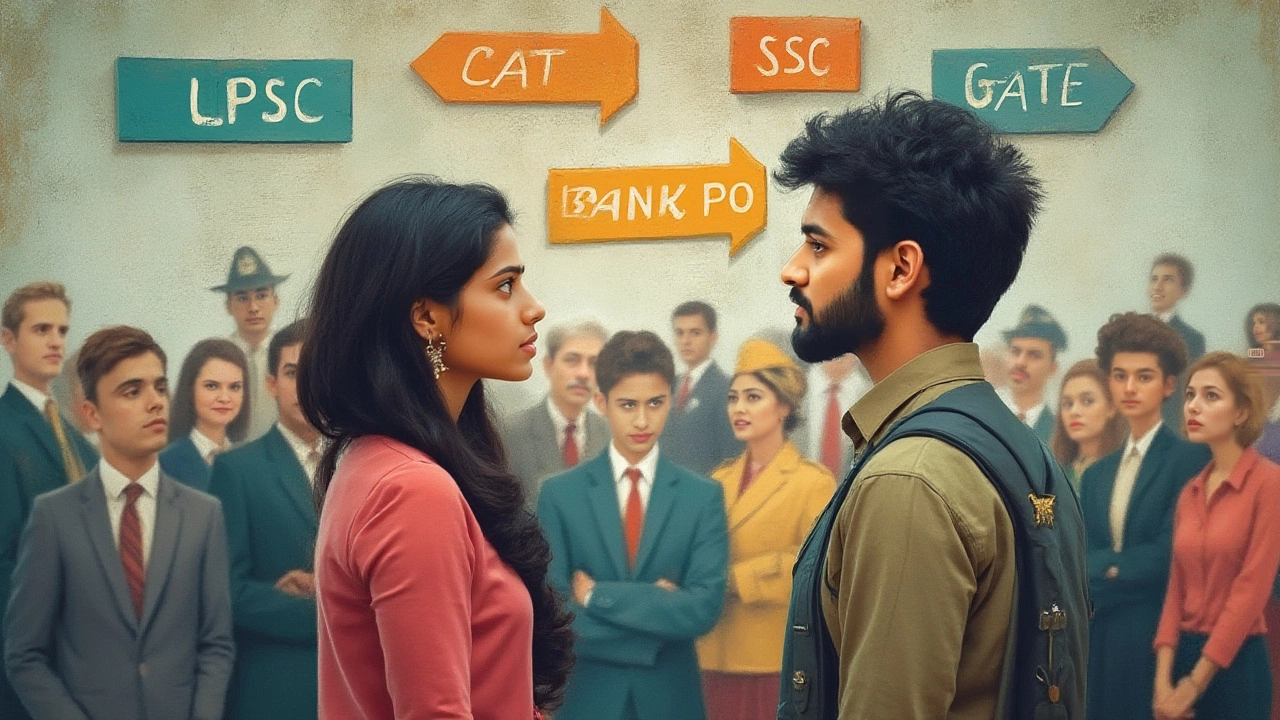If you think the stress of exams ends with your college degree, you're in for a surprise. Once that graduation hat lands on your head, an even tougher question starts circling your mind—what next? For years, competitive exams have been the golden ticket for millions of fresh graduates in India, promising everything from job security to fat paychecks and respect in society. But flipping through page after page of exam lists can make your head spin. Which one is truly worth your time and effort? It’s not just about grabbing any job; it's about choosing a path that fits your dreams, skills, and maybe even your parents' expectations. Ready to cut through the noise and find out which competitive exam makes sense for you? Let's break it all down.
Why Competitive Exams Remain the Fastest Ticket to a Great Career
Competitive exams have a long history in India, with roots that go back to the British civil service and before. They aren’t going anywhere soon, and here’s why: Over 3 crore Indians appear for various competitive exams every year, according to data from 2023. That number alone should clue you in on just how seriously these tests are taken.
Government jobs—the supposed dream for so many—are still among the biggest draws. Roughly 20 lakh central and state government positions appear each year, and entry into these is almost always through a competitive exam. The perks? Let’s spell it out: job security, fixed hours, health benefits, and in many cases, housing and pension. You can hardly find these perks in most new-age private sector jobs. The banking sector alone hired more than 80,000 people through exams like IBPS and SBI PO in 2023. The cut-throat competition means you’re not just fighting for jobs, you’re fighting for lifestyle stability.
But it’s not just sarkari naukri, or government jobs, grabbing the headlines. Technology, business, and creative industries are now running their own examinations for entry-level jobs and higher studies. These may not guarantee government-level perks but often offer better pay and faster promotions, especially in private banks or MNCs. Take the GATE exam, for example—it opens doors to PSUs and research but is also accepted for international postgraduation courses. CAT, the MBA entrance, is almost mandatory if you’re eyeing top Indian B-schools like IIMs, XLRI, or FMS, where average placement salaries have crossed Rs 32 lakh per annum in 2024.
What really keeps these exams popular is that they are, in a sense, the great equalizer. It doesn’t matter if you’re from a tiny village or a metro city—if you have the brains and discipline, your background fades away inside that exam hall. This sense of fairness is a powerful driver for millions of aspirants like you.
Still, it’s not the cakewalk that many hanker for. Seats are limited and the syllabus is vast. Data from UPSC shows a ruthless 0.2% selection rate in the 2023 Civil Services Exam, where out of 13 lakh applicants, only 2,700 made it. It’s similar for top MBA and bank exams. What does this mean? You definitely need to pick the exam that aligns with your strengths and goals—not just because of family pressure or trends.
Breaking Down the Most Popular Competitive Exams After Graduation
So, which competitive exams can you actually take after graduation? It's not just about government jobs—though they're the most common choice. Let's look at a mix of opportunities based on real figures, salary promises, and career growth options.
- UPSC Civil Services Exam: This is the Mount Everest of Indian exams. Cracking it gets you into the IAS, IPS, IFS, and other elite services. The initial basic salary of an IAS officer (as per the 7th Pay Commission) starts at around ₹56,100 per month, but with perks, it often crosses ₹1 lakh easily. Competition is brutal, with less than 1% success rate. You'll need to cover subjects ranging from history to economics and ethics, and current affairs play a huge role.
- SSC CGL: The Staff Selection Commission Combined Graduate Level exam is the main gateway to government ministries, tax departments, and more. Jobs range from inspectors to accountants with salaries typically around ₹44,900–₹1,42,400 per month (including allowances). Around 30 to 40 lakh candidates appear each year. It tests reasoning, maths, English, and general awareness.
- Banking Exams (IBPS PO, SBI PO, RBI Grade B): The banking sector loves fresh graduates. IBPS PO and SBI PO exams can get you into public sector banks, while RBI Grade B is for the Reserve Bank. RBI offers one of the highest salaries, with Grade B officers starting at ₹84,000 per month (gross), plus excellent perks. The selection ratio is better than UPSC but still tough—less than 1% get selected each year.
- CAT (Common Admission Test): If management and business excite you, CAT is unavoidable. It secures entry into IIMs and top B-schools. Around 2.5 lakh students appeared for CAT 2024, competing for just 6,000 seats in IIMs. High scorers land jobs with packages easily crossing ₹25–₹35 lakh per annum after completing their MBAs from IIMs.
- GATE (Graduate Aptitude Test in Engineering): Aspirants from science and engineering backgrounds use GATE to pursue M.Tech courses, research, or join PSUs like IOCL, NTPC, and ONGC. In 2024, nearly 6.7 lakh students took GATE, aiming either for higher studies or PSU jobs that start with annual CTCs of ₹12–₹18 lakhs.
- Defense Exams (CDS, AFCAT, INET): If you want action and pride, consider Combined Defense Services or Air Force Common Admission Test. CDS clears your path to Army, Navy, or Air Force officer roles. Starting salaries range from ₹56,100 per month, plus free stays, rations, and more.
- State Public Service Commissions: Each state runs its own set of exams for administrative, police, and revenue jobs. The process is similar to UPSC but focuses mainly on state-related content and languages.
- Private Sector Exams: Many MNCs conduct entrance or aptitude tests for graduates, although these aren’t as formally organized as public sector exams. IT service giants like TCS, Infosys, and Wipro run their own tests, while companies like Google, Microsoft, and Amazon prefer direct interviews but sometimes use coding rounds or assessments for mass hiring.
What’s interesting is the sheer volume. Here's a quick look at how many people applied for some major exams in 2024:
| Exam | Applicants | Selection Rate (%) | Starting Salary (per month) |
|---|---|---|---|
| UPSC CSE | 13,00,000 | 0.2 | ₹56,100 |
| SSC CGL | 30,00,000+ | 1.4 | ₹44,900 |
| IBPS PO | 10,00,000+ | 1.5 | ₹52,000 |
| CAT | 2,50,000+ | 2.5 | — |
| GATE | 6,70,000 | 16 | ₹60,000+ |
| CDS | 3,00,000 | ~2 | ₹56,100 |
This isn’t the full list—pharma, law, teaching, and hospitality have their own tests as well. The verdict? Keep your options open, but don’t overload yourself. Each test requires a specific strategy, and it’s better to excel at one than be mediocre at five.

How to Decide Which Exam is Right for You
It can feel overwhelming to pick the “best” exam. Everyone’s got an opinion—parents, friends, some random uncle you last met at a wedding. But here’s what actually works: start with your own interests, strengths, and long-term career vision.
Let’s break it down another way. Are you the kind who loves reading about history and current events? UPSC or SSC CGL maybe your jam. Math whiz or coding nerd? Crack GATE or head for IT jobs. Want business suits, glass buildings, or a shot at entrepreneurship? Then chase CAT for that MBA. Dreamt of uniform and discipline since childhood? The defense exams like CDS or AFCAT are calling your name.
Your degree also plays a big role. Engineers and science grads get the best shot at GATE, PSUs, RBI Grade B (if you love economics/statistics), and technical posts. Arts or commerce grads tend to fit better with SSC, MBA, defense (non-tech entry), or even UPSC. Don’t forget the perks beyond just money—work-life balance, growth, and respect matter too. A teacher’s job through CTET or state teacher eligibility tests might pay less but offers stability and holidays.
Here are some tips to help you choose smartly:
- Analyze past years' cutoff marks and paper patterns for your chosen exams. If you’ve struggled with certain sections in college, beware of exams heavy in those subjects.
- Check future prospects. Will this job still be in demand in 10 or 20 years? For example, IT sector jobs might change fast but government jobs are stable.
- Be practical about your own timeline. Some exams take more than a year to prepare well—UPSC is the prime example. Others, like banking, can be cracked in a few months with focused study if you already have the basics strong.
- Talk to real people, not just YouTubers or influencers. Reach out to someone who recently cleared the exam you’re targeting. Most will reply if you message politely on LinkedIn or Instagram.
- Don’t ignore mental health. Exam prep can be isolating. Make sure whatever you choose, you’re ready for at least 6-12 months of disciplined focus—sometimes without instant rewards.
- competitive exams after graduation are not a one-size-fits-all journey. What works for your classmate or cousin may not work for you—it's totally okay to pick a different path.
Smart Prep and Little-Known Secrets to Crack the Top Exams
You’ve settled on the field. Now come the real headaches: actual prep, managing time, and knowing secret hacks that toppers use again and again. So, what holds toppers apart from the crowd?
First up, strategy. The best performers know the syllabus—inside out. They don’t just read every book suggested by coaching centers. Instead, they compare the last 5–10 years’ papers and identify recurring topics. Here’s a trick; most exams recycle about 60% of their questions’ formats, just with a twist in data or scenarios.
Consistency matters more than speed. Toppers rarely study 12 hours a day. Instead, they break up their day with slots—2 hours for theory, 1 hour for mocks, and regular breaks for retention. The smartest ones test themselves weekly, not monthly. Mock tests and practice questions are your best friends; they reveal weaknesses that textbooks never show.
Another secret—use technology, but wisely. Download apps like Oliveboard, Gradeup, or Unacademy for daily quizzes. Make short notes or flashcards; you can review them on the go, and they work wonders for memory-based sections like GK or vocabulary.
Take care of your health, too—no exam is worth burning out. Simple homemade food, regular walks, and 7–8 hours of sleep can decide whether you remember a fact in the exam hall or blank out completely. Pro tip: Try meditation for 10 minutes before bed. It might sound boring, but topper interviews show that stress control is often the secret edge during final rounds or interviews.
Lastly, keep your sources limited but revisable. Don’t fall into the trap of hoarding PDFs or books that others recommend. Build your own “core set” of notes and test yourself regularly. If preparing for multiple exams, focus on common sections like reasoning, English, and maths—but don’t skip the unique parts for each exam (like essays for UPSC, group discussion for MBA, or technical sections for GATE).
Solid prep is more marathon than sprint. You’ll hit lows, plateau, even envy friends who already got jobs. That’s normal. What matters is getting back on track every time. Find a peer group or community—Telegram groups, Reddit, or small study circles work wonders for motivation and resource sharing.
If you want a final quick tip—accept that some luck always plays a role. The best you can do is tip the odds in your favor. Study smart, stay curious, and remind yourself that exams are just doors—they don’t decide your whole life.
Picking and preparing for the right competitive exam isn’t easy, but with the right blend of self-awareness, research, and discipline, you’ll give yourself the best shot possible. And who knows? A year from now, you could be the one everyone else wonders about, asking, “How did they do it?”



